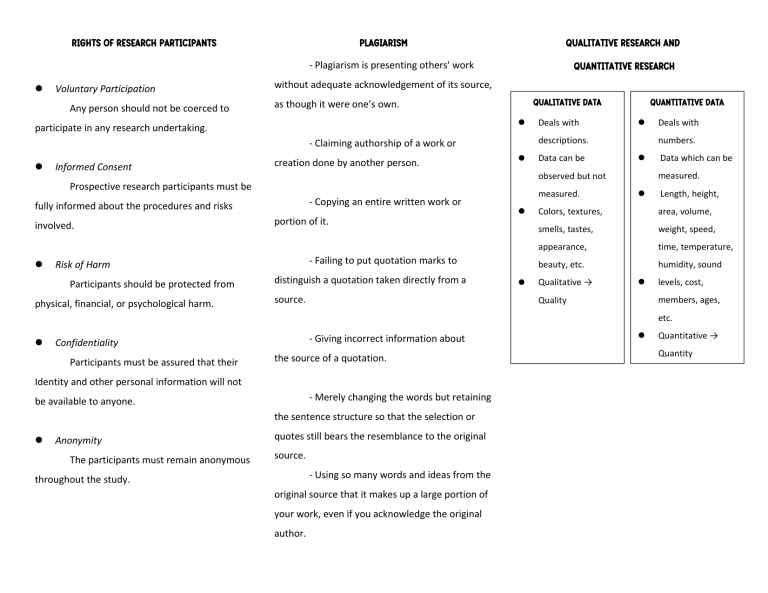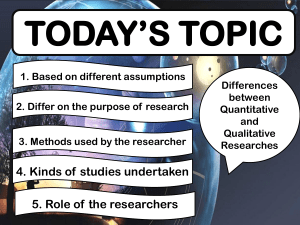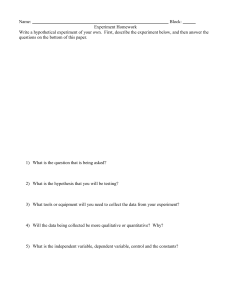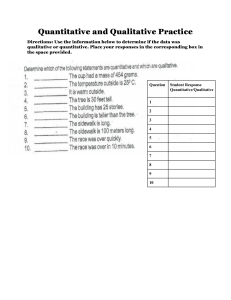
RIGHTS OF RESEARCH PARTICIPANTS PLAGIARISM QUALITATIVE RESEARCH AND - Plagiarism is presenting others' work Voluntary Participation Any person should not be coerced to QUANTITATIVE RESEARCH without adequate acknowledgement of its source, participate in any research undertaking. Informed Consent creation done by another person. fully informed about the procedures and risks involved. portion of it. Participants should be protected from physical, financial, or psychological harm. distinguish a quotation taken directly from a source. Data can be measured. - Failing to put quotation marks to Risk of Harm Deals with numbers. Data which can be measured. observed but not Prospective research participants must be - Copying an entire written work or Deals with descriptions. - Claiming authorship of a work or QUANTITATIVE DATA QUALITATIVE DATA as though it were one’s own. Length, height, Colors, textures, area, volume, smells, tastes, weight, speed, appearance, time, temperature, beauty, etc. humidity, sound Qualitative → levels, cost, members, ages, Quality etc. - Giving incorrect information about Confidentiality Participants must be assured that their the source of a quotation. Identity and other personal information will not - Merely changing the words but retaining be available to anyone. the sentence structure so that the selection or Anonymity The participants must remain anonymous quotes still bears the resemblance to the original source. - Using so many words and ideas from the throughout the study. original source that it makes up a large portion of your work, even if you acknowledge the original author. Quantitative → Quantity QUALITATIVE RESEARCH Case study This study involves an investigation of a A type of research that aims to gather and Researchers are sensitive to participants’ needs and participants are actively engaged analyze non numerical data in order to gain an person, group, organization, or situation for a understanding of individuals' social reality, long period of time to explain why such things including understanding their attitudes, beliefs, occur to the subject under study. Some examples observation,interviews, documents, e-mails, and motivation. of this type of study are the fields of social care, blogs, videos, etc. nursing, psychology, rehabilitation centers, KINDS OF QUALITATIVE RESEARCH Phenomenology It is the study of how people give meaning to their experiences, like the death of loved ones, care for the people, and friendliness of the people. Ethnography It is understanding of how a particular It may result in changes in research questions after new discoveries occur. It develops from Historical Analysis This is the study of primary documents to concepts. It is a process of describing a situation, explain the connection of past events to analyzing data for themes or categories, and the present time. An example of this is explaining making interpretations or drawing the happenings during the conclusions. Marcos regime. It may be subjected to the researcher’s personal interpretation. CHARACTERISTICS AND USES OF operations, and lifestyle. QUALITATIVE RESEARCH Grounded Theory Qualitative research takes place in a natural setting like home, school, institution, or This occurs when a researcher discovers a community. Researchers gain actual new theory based on the data collected. It is a substantive area. Data are collected through a specific to a general understanding of includes their organizational set-up, internal research methodology for discovering theory in a education, etc. cultural group goes about their daily lives which in the process. experiences of the research participants. It focuses on participants’ perceptions and experiences (Franenkel and Wallen, 1988 in Creswell, 2013) The researchers, as a primary instrument in data collection, view social phenomena and situations holistically STRENGHTS OF QUALITATIVE RESEARCH WEAKNESSES OF QUALITATIVE RESERACH 1. Issues can be analyzed through detailed 1. Research quality is heavily dependent and deep examination. on the researcher’s skills and may be influenced by the researcher's outlooks. 2. Interviews are not being delimited to specific questions and can be 2. the volume of data makes analysis and guided/redirected by the researcher along interpretation time-consuming. the process. 3. Issues of anonymity and confidentiality 3. The research framework and direction can bring/result in problems when can be easily revised as new information presenting findings. emerges. 4. The researcher's presence during data 4. The obtained data from human gathering, which is often unavoidable in experience is powerful and sometimes qualitative research, can affect the more interesting than quantitative data. subjects' attitudes towards the process.



